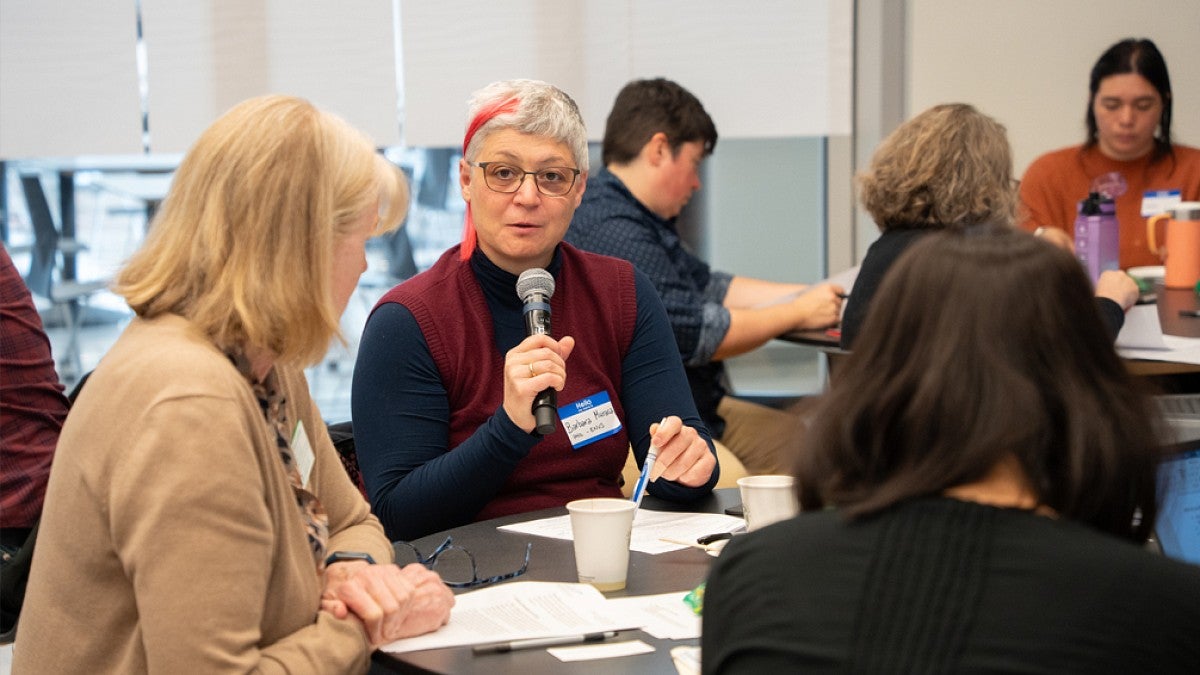
CAS community weighs in on emerging strategic priorities
The College of Arts and Sciences is developing a new blueprint for the future, and members of its community had the chance to help shape the strategy during two CAS Community Conversations in April 2024.
More than 100 faculty, staff and students turned out to help develop the key strategic priorities that will serve as the college’s guiding star in the years ahead.
“Our strategic plan is a chance for us to reflect on who we are as a community and what makes us distinctive,” said Chris Poulsen, Tykeson Dean of Arts and Sciences. “We’ll use it to set high-level directions that align to our mission and guide our resource allocation.”
The CAS Community Conversations represent a key milestone in a months-long strategic planning process that began last fall. CAS leaders spoke with scores of students, staff, faculty and alumni, both individually and in groups—a process that has helped “strengthen our bonds as a community,” Poulsen said.
“Those conversations were tremendously fun, insightful and thoughtful, and they brought us to where we are today,” he added.
During the CAS Community Conversations, Poulsen invited attendees to provide feedback on three key priorities that emerged from the strategic planning process:
Education for a complex and changing world
Today’s students will most likely switch careers multiple times throughout their lifetime, and a liberal arts education promises to prepare them for that. But one important question that arose was: How can we be sure we’re giving students a true liberal arts education?
“We’re very much wanting to look at the core curriculum and take it apart, start over and reshape it,” Poulsen said, adding that CAS needs to make liberal arts relevant in the 21st century. “What does the future look like if AI is a presence? How can we weave computer science and data science throughout the college? And what are our values, and are they different from what they were yesterday?”
Expanding experiential learning opportunities to help students become career ready stood out as a top priority to Sheila Keen, associate director of ASU 2—especially when it comes to preparing graduate students to contribute both as scholars and professionals.
“It’s hard to get a job as a teacher or professor,” she said. “A lot of times, students get jobs in outside fields. How do we prepare graduate students for that? What opportunities do we give them to move into the field? What knowledge are we passing along to them?”
Impactful scholarship
Raising visibility around the value of a UO liberal arts education was another topic of conversation as attendees discussed the importance of interdisciplinary collaboration within CAS, across the UO and with other universities.
“Ducks are famous for football, but increasing collaboration between departments could improve our academic reputation nationally,” said Jaeden Noronha, a senior majoring in economics and political science.
A culture of belonging and well-being
The majority of attendees liked the idea of creating a “culture of stay” where everyone, especially those from historically underrepresented populations, feels safe and welcome.
Grace Godfrey, operations manager for ASU 2 and a member of the strategic planning committee, was excited to see an emphasis on increasing meaningful collaboration between staff and faculty.
“Just being here is energizing,” she said of the event. “It’s encouraging to see faculty, staff and students collaborate in a neutral space.”
Noronha, a student member of the strategic planning committee, said he appreciated the inclusivity of the open meeting format.
“I think so far the process has been extremely streamlined,” he said.
Several attendees expressed curiosity about what specific changes might stem from the new strategic plan.
“I would love to see some concrete proposals come out of these emerging priorities,” said Camisha Russell, associate professor in the Department of Philosophy.

